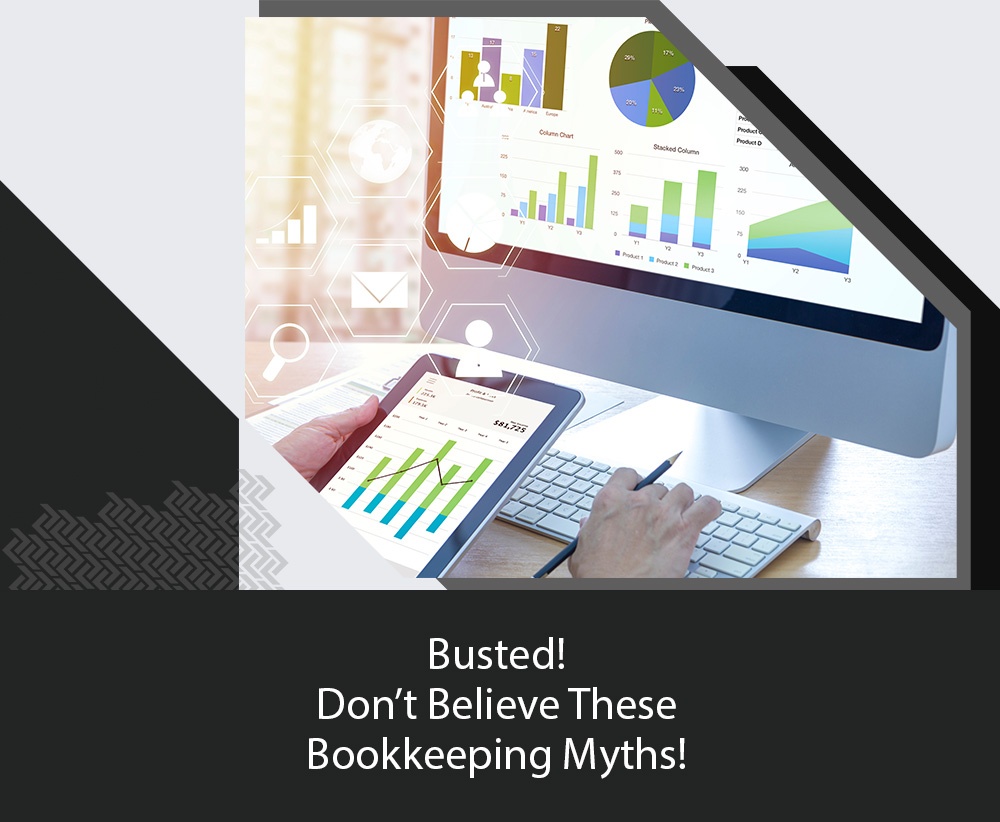Busted! Don’t Believe These Bookkeeping Myths!

Bookkeeping plays a crucial role in the financial management of any business, but there are several misconceptions that can cloud people’s understanding of its true value. In this blog, we aim to debunk these myths and shed light on the real significance of bookkeeping in today’s business landscape. Over the years, bookkeeping has evolved significantly, embracing new technologies and encompassing a wide range of responsibilities beyond just data entry. Additionally, there is often confusion between the roles of bookkeepers and accountants, leading to the belief that one is superior to the other. Lastly, some believe that bookkeeping is only necessary for large corporations, neglecting its importance for small businesses. Let’s bust these myths wide open and gain a deeper understanding of the world of bookkeeping.
Myth 1: Bookkeeping is only about data entry
One of the most common misconceptions about bookkeeping is that it revolves solely around data entry, involving the recording of financial information. This misunderstanding is rooted in the historical role of bookkeepers, where manual data entry was indeed a primary task. However, with advancements in technology, the bookkeeping landscape has transformed dramatically.
Modern bookkeepers are multifaceted professionals, serving as indispensable financial partners to businesses. While data entry remains a fundamental aspect, it is no longer the sole focus. Today, bookkeepers take on roles such as internal auditing, taxation, payroll processing, cash flow management, preparation of financial reports, and managing accounts payable and receivable. They are instrumental in providing accurate financial insights that enable informed decision-making by business owners. By understanding this myth, you can truly appreciate the diverse and valuable contributions that bookkeepers make to the success of your business.
Myth 2: Accountants are better to hire than a bookkeeper
The distinction between the roles of bookkeepers and accountants can be confusing, leading some to believe that accountants are superior and more suitable for handling financial matters. However, it’s essential to understand that accountants and bookkeepers each bring distinct expertise to the table, and their roles are complementary, not competitive.
Bookkeepers focus on the day-to-day financial transactions and the maintenance of accurate and up-to-date financial records. They ensure that all financial data is organized, classified, and readily available for analysis. On the other hand, accountants use this data to prepare financial statements, conduct audits, and provide strategic financial advice.
Collaboration between bookkeepers and accountants is key to a well-functioning financial ecosystem. Bookkeepers provide the foundational data and analysis, while accountants leverage this information to offer comprehensive financial insights and reporting. Recognizing the synergy between these two roles is crucial for a business’s financial success, as both are essential components of the financial management process.
Myth 3: Only big businesses need bookkeepers
A prevalent misconception is that bookkeeping is exclusive to large corporations with complex financial operations. In reality, bookkeeping is vital for businesses of all sizes, including small and medium enterprises. When a business is just starting, the owner may handle the bookkeeping tasks themselves, which can be manageable initially. However, as the business grows, so does the complexity of its financial transactions.
Even small businesses can have intricate bookkeeping requirements, including managing expenses, tracking sales and receivables, reconciling bank statements, and ensuring compliance with tax regulations. Engaging a skilled bookkeeper enables business owners to focus on core operations and strategic planning while maintaining accurate financial records.
Moreover, a proficient bookkeeper can help identify financial trends, forecast cash flow, and offer valuable insights to drive business growth. Embracing bookkeeping early on can save a business from potential financial pitfalls and foster long-term success.
Now that we’ve debunked these common bookkeeping myths, we hope you have gained a clearer understanding of the vital role bookkeepers play in today’s business environment. Beyond data entry, they are instrumental in providing financial clarity, ensuring compliance, and facilitating informed decision-making. Remember that both bookkeepers and accountants are essential components of a robust financial management system, and their collaboration can lead to optimal business outcomes.
If you’re looking for bookkeeping solutions, reach out to MK Bookkeeping Inc. We are a bookkeeping firm that takes pride in its connection with every client. Our clients are not just businesses; they are our associates.
For a complete list of our services, please click here. If you have any questions, we’d love to hear from you. Please contact us by calling (416) 451-3811 or maria@mkbookkeeping.com.